Ethical Implications: AI Replacing Human Labor & Sustainability
VerifiedAdded on 2021/05/31
|5
|1239
|36
Essay
AI Summary
This essay delves into the ethical considerations surrounding the replacement of human labor by artificial intelligence, examining virtues related to employment, knowledge acquisition, and cost reduction. It applies act utilitarianism to forecast the positive and negative effects, such as potential unemployment and operational cost diminishment. The essay also addresses legal challenges in sectors like transportation and considers the European Union's principles for AI. Analyzing Kant's categorical imperative, the essay questions the morality of granting legal status to robots and concludes that while AI offers advantages, its limitations, especially the lack of emotive power, raise concerns about its ability to fulfill all human roles. Ultimately, the essay argues against the unrestricted replacement of human labor by AI due to potential economic and social disparities, emphasizing the importance of ethical considerations over purely utilitarian outcomes. Desklib provides students with access to past papers and solved assignments.
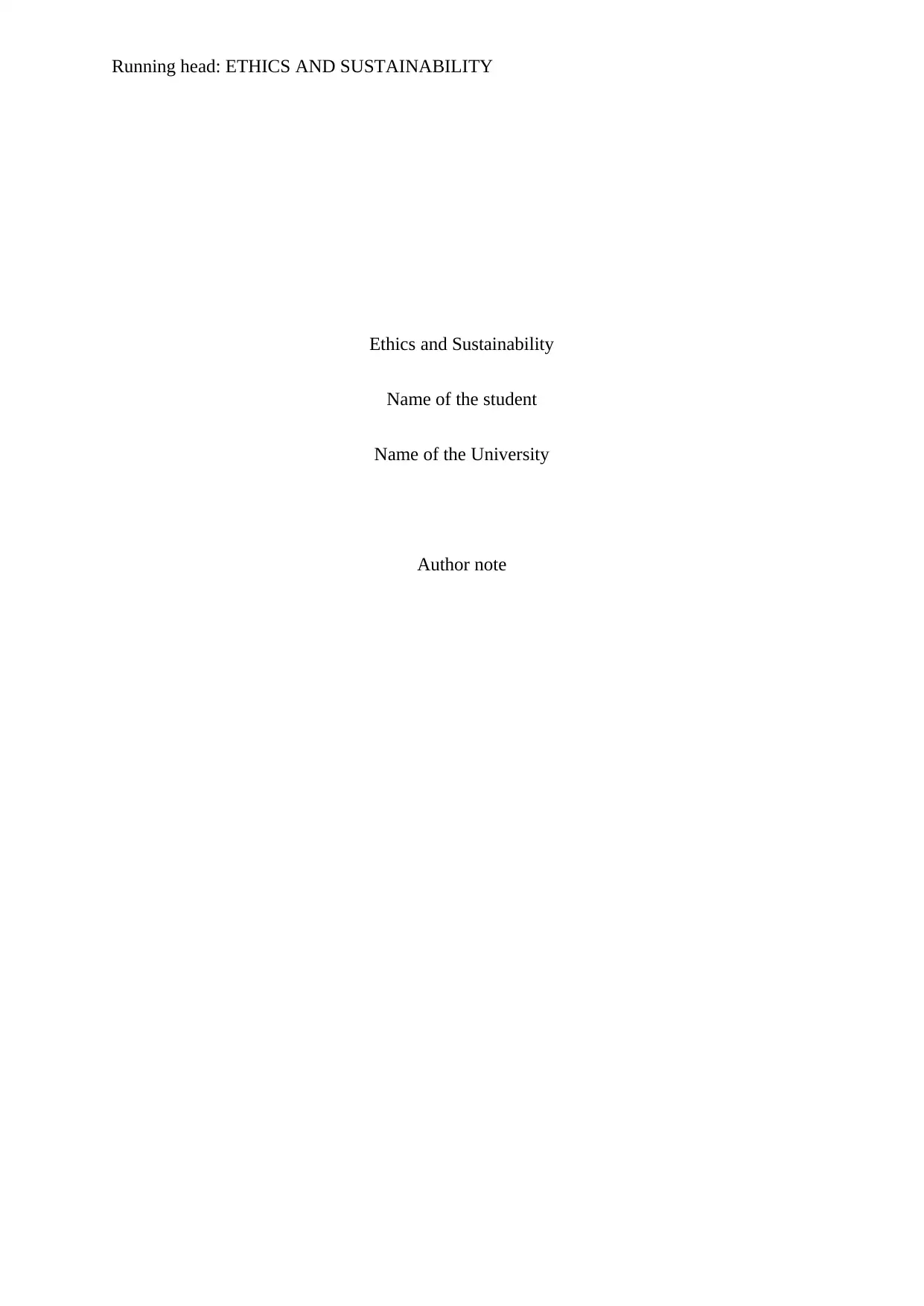
Running head: ETHICS AND SUSTAINABILITY
Ethics and Sustainability
Name of the student
Name of the University
Author note
Ethics and Sustainability
Name of the student
Name of the University
Author note
Paraphrase This Document
Need a fresh take? Get an instant paraphrase of this document with our AI Paraphraser
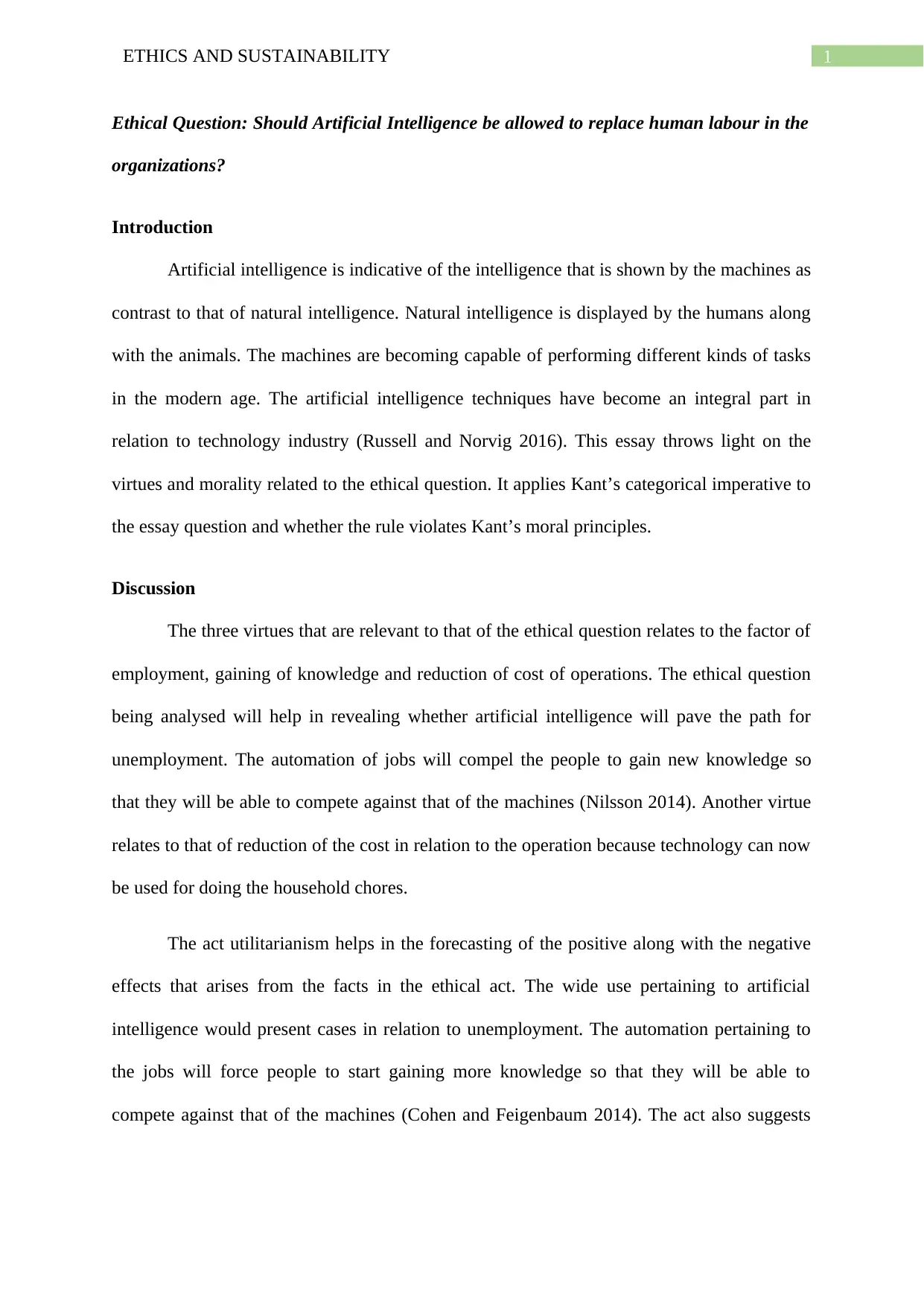
1ETHICS AND SUSTAINABILITY
Ethical Question: Should Artificial Intelligence be allowed to replace human labour in the
organizations?
Introduction
Artificial intelligence is indicative of the intelligence that is shown by the machines as
contrast to that of natural intelligence. Natural intelligence is displayed by the humans along
with the animals. The machines are becoming capable of performing different kinds of tasks
in the modern age. The artificial intelligence techniques have become an integral part in
relation to technology industry (Russell and Norvig 2016). This essay throws light on the
virtues and morality related to the ethical question. It applies Kant’s categorical imperative to
the essay question and whether the rule violates Kant’s moral principles.
Discussion
The three virtues that are relevant to that of the ethical question relates to the factor of
employment, gaining of knowledge and reduction of cost of operations. The ethical question
being analysed will help in revealing whether artificial intelligence will pave the path for
unemployment. The automation of jobs will compel the people to gain new knowledge so
that they will be able to compete against that of the machines (Nilsson 2014). Another virtue
relates to that of reduction of the cost in relation to the operation because technology can now
be used for doing the household chores.
The act utilitarianism helps in the forecasting of the positive along with the negative
effects that arises from the facts in the ethical act. The wide use pertaining to artificial
intelligence would present cases in relation to unemployment. The automation pertaining to
the jobs will force people to start gaining more knowledge so that they will be able to
compete against that of the machines (Cohen and Feigenbaum 2014). The act also suggests
Ethical Question: Should Artificial Intelligence be allowed to replace human labour in the
organizations?
Introduction
Artificial intelligence is indicative of the intelligence that is shown by the machines as
contrast to that of natural intelligence. Natural intelligence is displayed by the humans along
with the animals. The machines are becoming capable of performing different kinds of tasks
in the modern age. The artificial intelligence techniques have become an integral part in
relation to technology industry (Russell and Norvig 2016). This essay throws light on the
virtues and morality related to the ethical question. It applies Kant’s categorical imperative to
the essay question and whether the rule violates Kant’s moral principles.
Discussion
The three virtues that are relevant to that of the ethical question relates to the factor of
employment, gaining of knowledge and reduction of cost of operations. The ethical question
being analysed will help in revealing whether artificial intelligence will pave the path for
unemployment. The automation of jobs will compel the people to gain new knowledge so
that they will be able to compete against that of the machines (Nilsson 2014). Another virtue
relates to that of reduction of the cost in relation to the operation because technology can now
be used for doing the household chores.
The act utilitarianism helps in the forecasting of the positive along with the negative
effects that arises from the facts in the ethical act. The wide use pertaining to artificial
intelligence would present cases in relation to unemployment. The automation pertaining to
the jobs will force people to start gaining more knowledge so that they will be able to
compete against that of the machines (Cohen and Feigenbaum 2014). The act also suggests
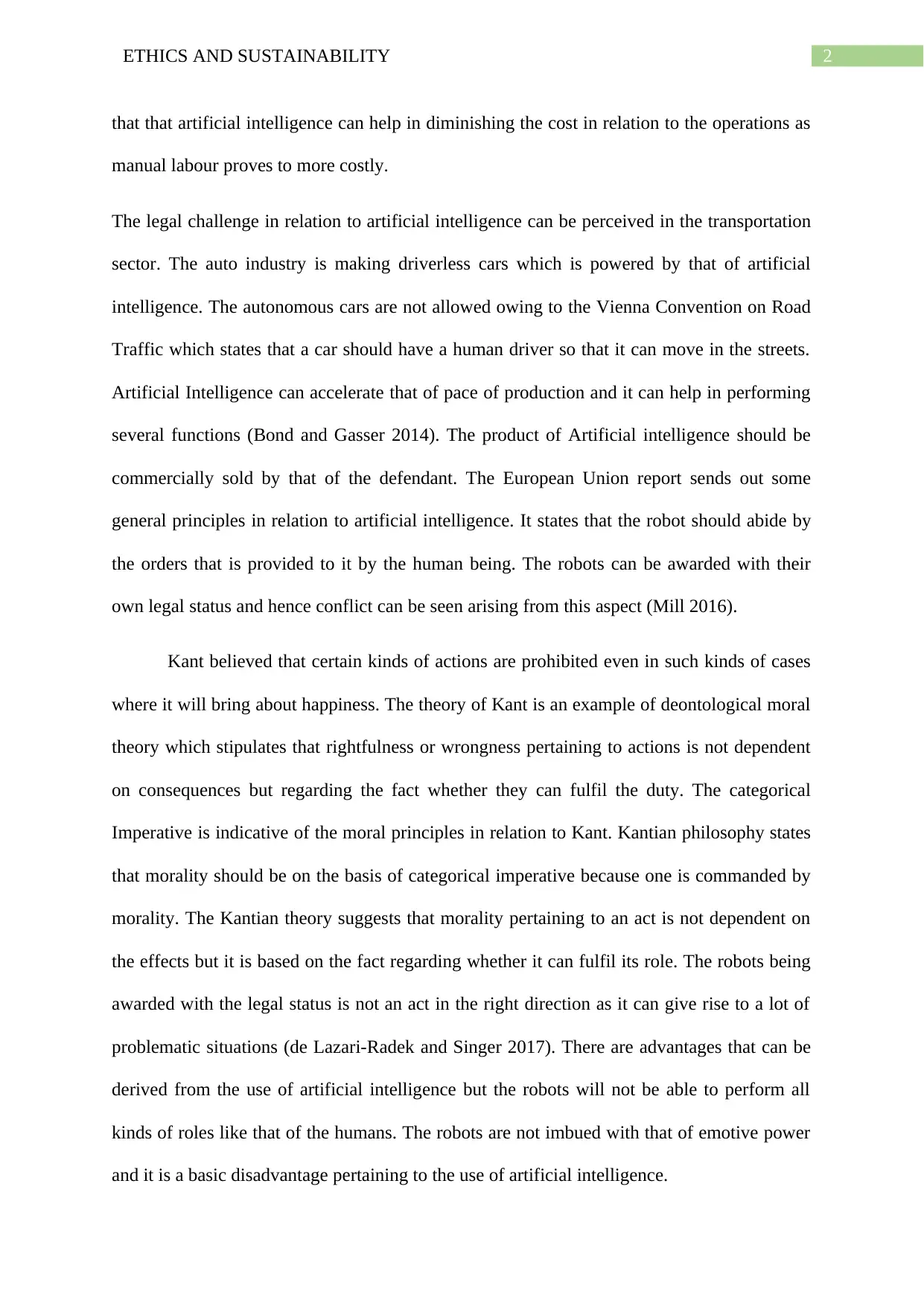
2ETHICS AND SUSTAINABILITY
that that artificial intelligence can help in diminishing the cost in relation to the operations as
manual labour proves to more costly.
The legal challenge in relation to artificial intelligence can be perceived in the transportation
sector. The auto industry is making driverless cars which is powered by that of artificial
intelligence. The autonomous cars are not allowed owing to the Vienna Convention on Road
Traffic which states that a car should have a human driver so that it can move in the streets.
Artificial Intelligence can accelerate that of pace of production and it can help in performing
several functions (Bond and Gasser 2014). The product of Artificial intelligence should be
commercially sold by that of the defendant. The European Union report sends out some
general principles in relation to artificial intelligence. It states that the robot should abide by
the orders that is provided to it by the human being. The robots can be awarded with their
own legal status and hence conflict can be seen arising from this aspect (Mill 2016).
Kant believed that certain kinds of actions are prohibited even in such kinds of cases
where it will bring about happiness. The theory of Kant is an example of deontological moral
theory which stipulates that rightfulness or wrongness pertaining to actions is not dependent
on consequences but regarding the fact whether they can fulfil the duty. The categorical
Imperative is indicative of the moral principles in relation to Kant. Kantian philosophy states
that morality should be on the basis of categorical imperative because one is commanded by
morality. The Kantian theory suggests that morality pertaining to an act is not dependent on
the effects but it is based on the fact regarding whether it can fulfil its role. The robots being
awarded with the legal status is not an act in the right direction as it can give rise to a lot of
problematic situations (de Lazari-Radek and Singer 2017). There are advantages that can be
derived from the use of artificial intelligence but the robots will not be able to perform all
kinds of roles like that of the humans. The robots are not imbued with that of emotive power
and it is a basic disadvantage pertaining to the use of artificial intelligence.
that that artificial intelligence can help in diminishing the cost in relation to the operations as
manual labour proves to more costly.
The legal challenge in relation to artificial intelligence can be perceived in the transportation
sector. The auto industry is making driverless cars which is powered by that of artificial
intelligence. The autonomous cars are not allowed owing to the Vienna Convention on Road
Traffic which states that a car should have a human driver so that it can move in the streets.
Artificial Intelligence can accelerate that of pace of production and it can help in performing
several functions (Bond and Gasser 2014). The product of Artificial intelligence should be
commercially sold by that of the defendant. The European Union report sends out some
general principles in relation to artificial intelligence. It states that the robot should abide by
the orders that is provided to it by the human being. The robots can be awarded with their
own legal status and hence conflict can be seen arising from this aspect (Mill 2016).
Kant believed that certain kinds of actions are prohibited even in such kinds of cases
where it will bring about happiness. The theory of Kant is an example of deontological moral
theory which stipulates that rightfulness or wrongness pertaining to actions is not dependent
on consequences but regarding the fact whether they can fulfil the duty. The categorical
Imperative is indicative of the moral principles in relation to Kant. Kantian philosophy states
that morality should be on the basis of categorical imperative because one is commanded by
morality. The Kantian theory suggests that morality pertaining to an act is not dependent on
the effects but it is based on the fact regarding whether it can fulfil its role. The robots being
awarded with the legal status is not an act in the right direction as it can give rise to a lot of
problematic situations (de Lazari-Radek and Singer 2017). There are advantages that can be
derived from the use of artificial intelligence but the robots will not be able to perform all
kinds of roles like that of the humans. The robots are not imbued with that of emotive power
and it is a basic disadvantage pertaining to the use of artificial intelligence.
⊘ This is a preview!⊘
Do you want full access?
Subscribe today to unlock all pages.

Trusted by 1+ million students worldwide
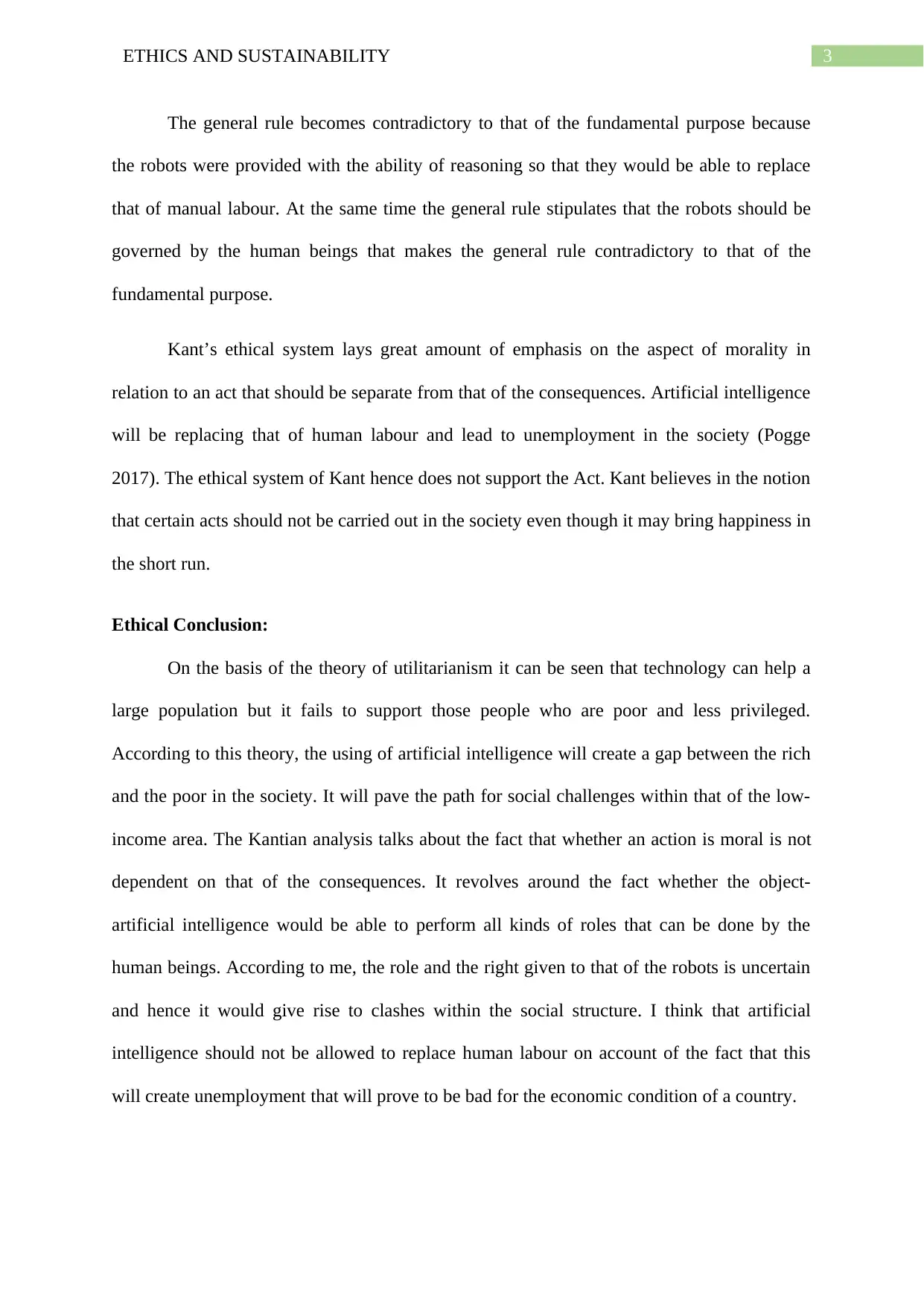
3ETHICS AND SUSTAINABILITY
The general rule becomes contradictory to that of the fundamental purpose because
the robots were provided with the ability of reasoning so that they would be able to replace
that of manual labour. At the same time the general rule stipulates that the robots should be
governed by the human beings that makes the general rule contradictory to that of the
fundamental purpose.
Kant’s ethical system lays great amount of emphasis on the aspect of morality in
relation to an act that should be separate from that of the consequences. Artificial intelligence
will be replacing that of human labour and lead to unemployment in the society (Pogge
2017). The ethical system of Kant hence does not support the Act. Kant believes in the notion
that certain acts should not be carried out in the society even though it may bring happiness in
the short run.
Ethical Conclusion:
On the basis of the theory of utilitarianism it can be seen that technology can help a
large population but it fails to support those people who are poor and less privileged.
According to this theory, the using of artificial intelligence will create a gap between the rich
and the poor in the society. It will pave the path for social challenges within that of the low-
income area. The Kantian analysis talks about the fact that whether an action is moral is not
dependent on that of the consequences. It revolves around the fact whether the object-
artificial intelligence would be able to perform all kinds of roles that can be done by the
human beings. According to me, the role and the right given to that of the robots is uncertain
and hence it would give rise to clashes within the social structure. I think that artificial
intelligence should not be allowed to replace human labour on account of the fact that this
will create unemployment that will prove to be bad for the economic condition of a country.
The general rule becomes contradictory to that of the fundamental purpose because
the robots were provided with the ability of reasoning so that they would be able to replace
that of manual labour. At the same time the general rule stipulates that the robots should be
governed by the human beings that makes the general rule contradictory to that of the
fundamental purpose.
Kant’s ethical system lays great amount of emphasis on the aspect of morality in
relation to an act that should be separate from that of the consequences. Artificial intelligence
will be replacing that of human labour and lead to unemployment in the society (Pogge
2017). The ethical system of Kant hence does not support the Act. Kant believes in the notion
that certain acts should not be carried out in the society even though it may bring happiness in
the short run.
Ethical Conclusion:
On the basis of the theory of utilitarianism it can be seen that technology can help a
large population but it fails to support those people who are poor and less privileged.
According to this theory, the using of artificial intelligence will create a gap between the rich
and the poor in the society. It will pave the path for social challenges within that of the low-
income area. The Kantian analysis talks about the fact that whether an action is moral is not
dependent on that of the consequences. It revolves around the fact whether the object-
artificial intelligence would be able to perform all kinds of roles that can be done by the
human beings. According to me, the role and the right given to that of the robots is uncertain
and hence it would give rise to clashes within the social structure. I think that artificial
intelligence should not be allowed to replace human labour on account of the fact that this
will create unemployment that will prove to be bad for the economic condition of a country.
Paraphrase This Document
Need a fresh take? Get an instant paraphrase of this document with our AI Paraphraser
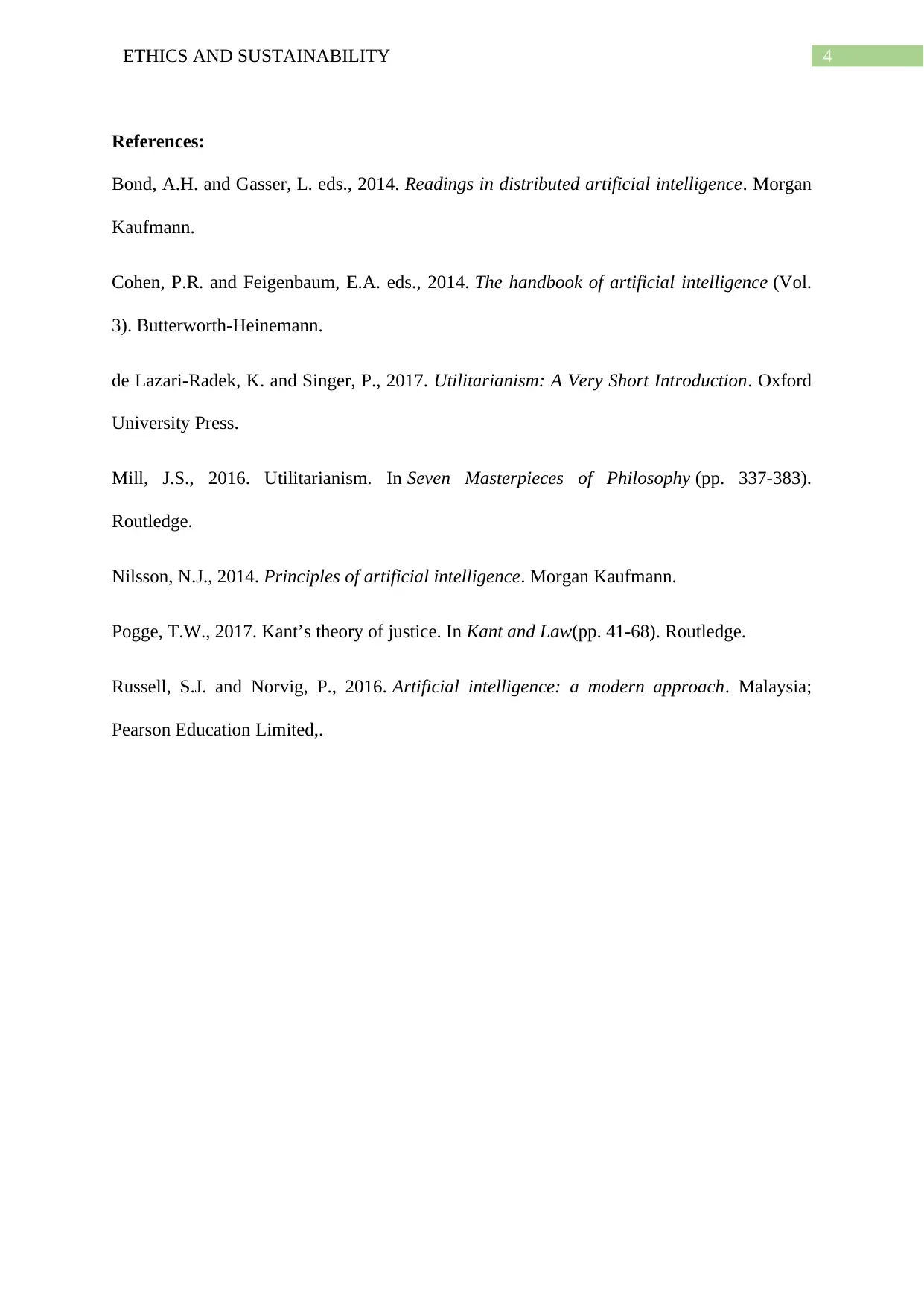
4ETHICS AND SUSTAINABILITY
References:
Bond, A.H. and Gasser, L. eds., 2014. Readings in distributed artificial intelligence. Morgan
Kaufmann.
Cohen, P.R. and Feigenbaum, E.A. eds., 2014. The handbook of artificial intelligence (Vol.
3). Butterworth-Heinemann.
de Lazari-Radek, K. and Singer, P., 2017. Utilitarianism: A Very Short Introduction. Oxford
University Press.
Mill, J.S., 2016. Utilitarianism. In Seven Masterpieces of Philosophy (pp. 337-383).
Routledge.
Nilsson, N.J., 2014. Principles of artificial intelligence. Morgan Kaufmann.
Pogge, T.W., 2017. Kant’s theory of justice. In Kant and Law(pp. 41-68). Routledge.
Russell, S.J. and Norvig, P., 2016. Artificial intelligence: a modern approach. Malaysia;
Pearson Education Limited,.
References:
Bond, A.H. and Gasser, L. eds., 2014. Readings in distributed artificial intelligence. Morgan
Kaufmann.
Cohen, P.R. and Feigenbaum, E.A. eds., 2014. The handbook of artificial intelligence (Vol.
3). Butterworth-Heinemann.
de Lazari-Radek, K. and Singer, P., 2017. Utilitarianism: A Very Short Introduction. Oxford
University Press.
Mill, J.S., 2016. Utilitarianism. In Seven Masterpieces of Philosophy (pp. 337-383).
Routledge.
Nilsson, N.J., 2014. Principles of artificial intelligence. Morgan Kaufmann.
Pogge, T.W., 2017. Kant’s theory of justice. In Kant and Law(pp. 41-68). Routledge.
Russell, S.J. and Norvig, P., 2016. Artificial intelligence: a modern approach. Malaysia;
Pearson Education Limited,.
1 out of 5
Related Documents
Your All-in-One AI-Powered Toolkit for Academic Success.
+13062052269
info@desklib.com
Available 24*7 on WhatsApp / Email
![[object Object]](/_next/static/media/star-bottom.7253800d.svg)
Unlock your academic potential
Copyright © 2020–2026 A2Z Services. All Rights Reserved. Developed and managed by ZUCOL.





